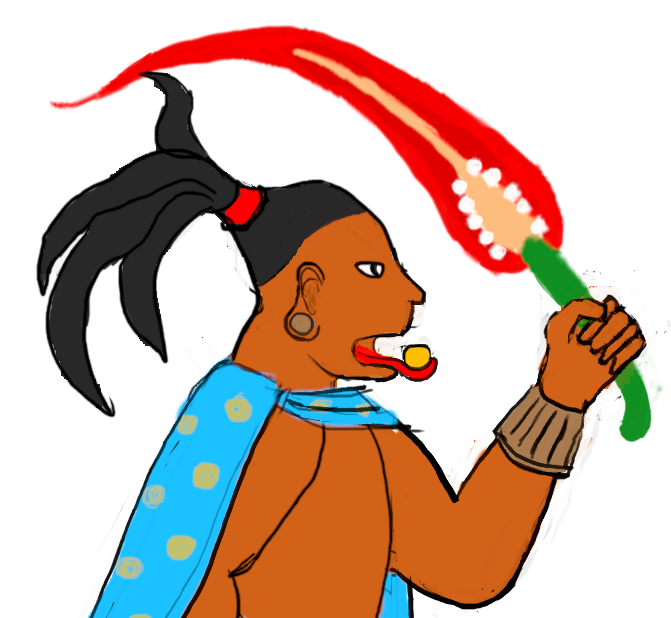Araš
"Kušmu will be visiting the temple to see the Namegivers," the elder woman spoke to her friend with great pride. Not many could afford such audience. "And if you value your grandson's life, you should advise your son to do the same."
Not a separate language — Summary
While treated by most of the Aškari as a separate language and and art of its own, Araš is technically a mix of the old traditional language — Ašu and the maternally spoken Aškari language. The former is used specifically for formation of the Small Names, also known as bāṣu — grains of sand, i.e., descriptors which capture unique features of ones soul. These are then unified by the maternal Aškari to form the so-called True Name by the so-called Namegivers and people pay great wealths to secure immutability of their or their relatives soul.
Maternal form of Aškari
The sentences are spoken like a single long word with stresses on the beginning of the words or interfixes, with the interfix being more important. A pause signals either the end of a sentence or, in rare cases, the presence of a glottal stop.
Social importance
The knowledge of Araš is not a common one and thus to acquire audience of a Namegiver belongs usually to the upper caste, with exceptions being made for those who can donate sufficiently high offering. It is expected of the highest rank priests, nobles and people of the high court to be given a Proper Name and there were occassions when a shortened and a simplified version of those would be used as a formal name, rank or title. The Proper Name prevents one from changing, at least with regard to the aspects covered by the Namegiver. As such, it is thought as bringing a person a step closer to the Evergreen Gardens — the realm of immutable ideas as Aškari call Ædeos. There exist many names, with varying complexity. The more fundamental traits are embedded, the higher the social rank of its owner, however at a price of revealing ones true self to the public — another reason why Namegiving is the domain of the powerful mostly.
Special characteristics
Araš is used for binding characteristic traits to ones self. The binding itself consists of a set of Ašu logographs, called bāṣu. Each and every one of them must be spelled in all possible variants, which reveals the difficult part of the namegiving — not only the fundamental logographs must well describe a bound trait of the person but also all of the compound variations. And so, with each new logograph added, the number of possibilities grows as well, increasing the risk of the Proper Name to not bind the soul properly. Araš is typically used to procure incantations with an interlaced structure. The opening and closing line would always be the thricely repeated Eua refering to the Primal Chaos, where Maternal, Paternal and Chaotic elements were one. In between would be the interchanging verses of thricely reapeated bāṣu and maternal Aškari. The Aškari verses would almost always be an expansion of the bāṣu, describing the property of the name, e.g., ùn (night) — the time between the days and the moment when light is gone, the glorious sea of to the moon and stars; the night is your name
Namegiving or Namebinding?
While widely regarded by Aškari as means of giving one a True Name, Araš is technically used to bind ones current self and prevent it from changing, rather than revealing it or preparing a new one.
The freeing of Ithrós
A famous use of the Namebinding spell was the attempt of the Aškari Namegivers to free Ithrós from the Mountain Prison of Gáláwá Lake and be embodied into Ayyaru — the Namegiveresse, who opened the ceremony by self-sacrifice. Believing the Beast of Winter to be the Silent Mother, who gave birth to the World and guides all towards unity, a spell was crafted to release Her. Four Namegivers were chosen as were the four bāṣu attributes: night, blindness, journey, woman. The Namebinding spell for Ithrós is broken into four parts, each starting with the respective attribute and adding details to refine the binded property.
Here is a fragment with the initial section containing the opening passage and the Part of the Night bāṣu:
Original
Eua, Eua, EuaUkūna-w-ušnunu-r-ukkūnu-w-uklutu-bišmitī-w-uṣalluli.
ùn, ùn, ùn
ùn-uršubišu-n-ušnunu-r-akkūna. Udnuna-ir-ušurrara-l-annaru-n-enūma-n-anmaru-n-abḫira-l-ubmūta-r-Usūna-l-Laimmanu; Umšūta-n-uršubišu-n-ušnunu-r-akkūna. mù, mù, mù
mù-uršubišu-n-ušnunu-r-akkūna. La-n-adgali-l-usmīḫu-n-alkukūti-kallūti-n-aḫšuḫtu-n-aṣibba-n-adigla-la-n-adgūli; Unṭūla-n-uršubišu-n-ušnunu-r-akkūna. ša', ša', ša'
ša'-uršubišu-n-ušnunu-r-akkūna. Ulkūta-l-aša-n-aṣrīma; atta-n-abiša-n-ušrura-l-umšula-l-uqūta-l-udnuna-n-ublūṭi-l-umūti; Ulkūta-n-uršubišu-n-ušnunu-r-akkūna. dǔ, dǔ, dǔ
dǔ-uršubišu-n-ušnunu-r-akkūna. U-ša-n-asmīḫa-l-aḫrīš-ublūṭi-ša-asmīḫ-ir-udunnūnu-n-ublūṭi-l-umūti-n-ir-Usūni-n-unmura. Uwūlta-n-uršubišu-n-ušnunu-r-akkūna. ùnmùša', ùnmùša', ùnmùša'
ùnmùša'-uršubišu-n-ušnunu-r-akkūna. Unnura-n-uḫsūsi-l-ugrura-nar-unundūni-l-ugrura-nar-usmūḫi; Ulkuta-nar-uškur-uršubišu-n-ušnunu-r-akkūna. ùnša'mù, ùnša'mù, ùnša'mù
ùnša'mù-uršubišu-n-ušnunu-r-akkūna. Ušūssa-ša-n-akirāta-n-ubullūṭa-l-ušūta-ša-n-aḫimāṭa-n-uputta-l-uṣlula-ša-n-akitāma-n-ummuma-tuan; Unṭūla-n-umūta-n-uršubišu-n-ušnunu-r-akkūna. ùnmùdǔ, ùnmùdǔ, ùnmùdǔ
ùnmùdǔ-uršubišu-n-ušnunu-r-akkūna. Uqūla-ša-n-iḫrāša-n-ukšušti-l-umê-bubba-tuani-l-išša-n-ud'umi-l-uqnuna-l-unub'i; Ugrunna-n-uškura-n-uršubišu-n-ušnunu-r-akkūna. ùndǔmù, ùndǔmù, ùndǔmù
ùndǔmù-uršubišu-n-ušnunu-r-akkūna. Ū-ša-n-ešēru-l-ukkuma-n-upšuti-l-Ū-ša-n-amīgārī-n-uṣūllāti; Unṭūla-n-urbūtan-uršubišu-n-ušnunu-r-akkūna. ùnša'dǔ, ùnša'dǔ, ùnša'dǔ
ùnša'dǔ-uršubišu-n-ušnunu-r-akkūna. Ū-ša-n-aḫir'ša-n-uqūta-l-ša-n-aribā-nar-usmūḫi-ša-n-abiš-ušurrāri-w-uqūti; Ugrunna-n-umūta-uršubišu-n-ušnunu-r-akkūna. ùndǔša', ùndǔša', ùndǔša'
ùndǔša'-uršubišu-n-ušnunu-r-akkūna. Ugrura-n-ukūri-l-ugrura-n-ubūra-n-ublūṭi-l-umūta-aṭīḫ; Urbūti-n-ulkuta-n-uršubišu-n-ušnunu-r-akkūna.
Transcription
Eua, Eua, EuaThe truth of your name is darkness of many shadows.
ùn, ùn, ùn
ùn is your name. the time between the days and the moment when the light is gone, the glorious sea to the moon and the stars; the night is your name mù, mù, mù
mù is your name. the lack of sight and the uniting nature of darkness, the need to observe, to see without seeing; the blindness is your name ša', ša', ša'
ša' is your name. the journey and the one, who ventures; you are the beginning, the middle and the end, the cycle of life and death; the journey is your name dǔ, dǔ, dǔ
dǔ is your name. The one, who unites and gives birth to life, who unites in the cycle of life and death by the moon light. the woman is your name. ùnmùša', ùnmùša', ùnmùša'
ùnmùša' is your name. the moment of understanding, the road to knowledge, the path to unity; the journey to Depth is your name ùnša'mù, ùnša'mù, ùnša'mù
ùnša'mù is your name. the blade that cuts all life, the flame that burns all bodies, the shadow that hides all to the sight; the blind Death is your name ùnmùdǔ, ùnmùdǔ, ùnmùdǔ
ùnmùdǔ is your name. the silent, who gave birth to the world, the water crystal clear yet dark, the home to the spring; mother Depth is your name ùndǔmù, ùndǔmù, ùndǔmù
ùndǔmù is your name. she, who rules justly, the consequence of action, she, who settles the diputes; the blind queen is your name ùnša'dǔ, ùnša'dǔ, ùnša'dǔ
ùnša'dǔ is your name. she, who gives birth to the end, who nurtures to unity, who is the beginning and the end; mother Death is your name ùndǔša', ùndǔša', ùndǔša'
ùndǔša' is your name. the path of the river, the way through the life, the death closing in; the queen's journey is your name






this is really cool! i love how you did the translations side by side. a language that's used exclusively for names is also really innovative. the repetition serving as building block for the name development is very nice.
Thank you <3 I'm glad you like it.